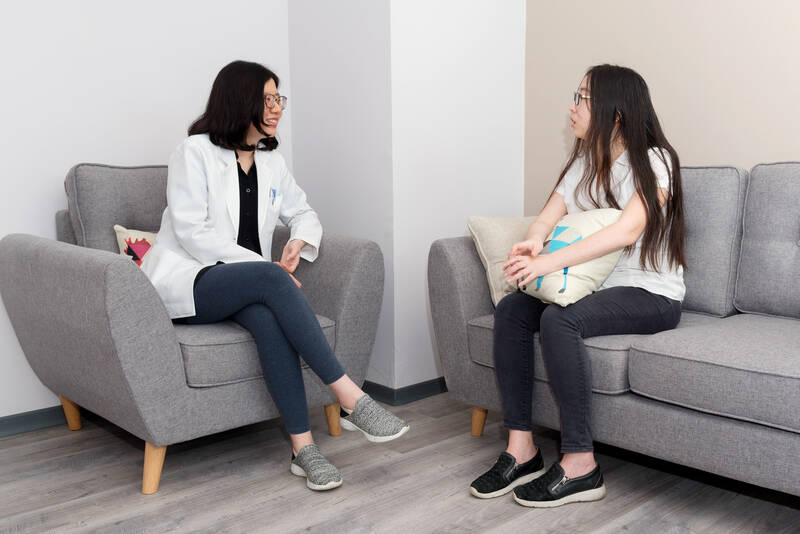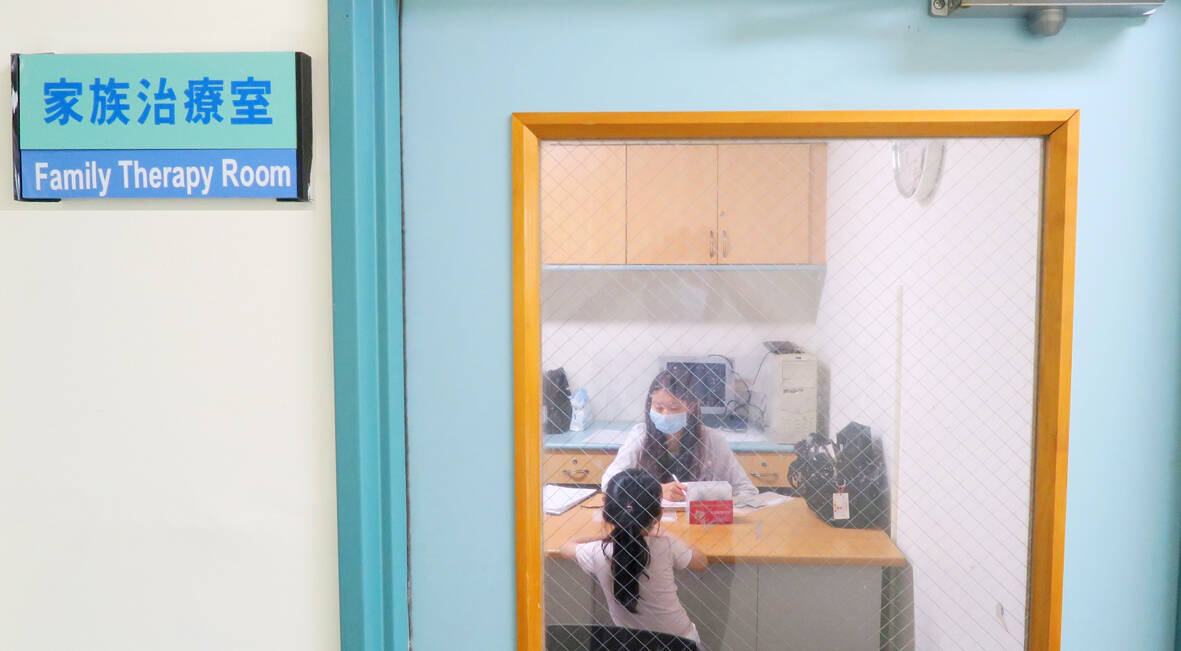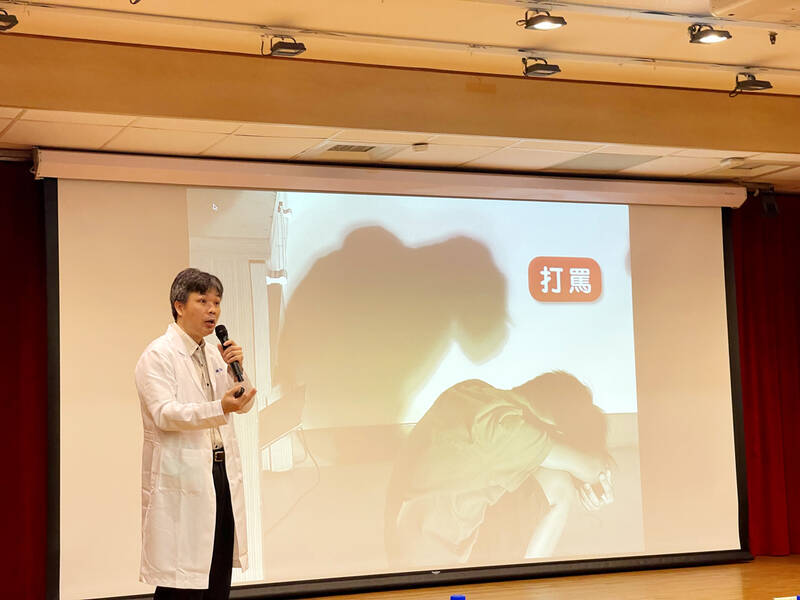Last week, representatives of an association of youth organizations challenged the presidential candidates in the upcoming election to articulate their positions on the extension of conscription to one year, a voting age of 18, housing justice, traffic safety, work environments and youth mental health.
While most of the issues they listed have constantly been in the news, the last has less prominence on the media radar, yet it is an urgent problem, one I see every day. Taiwan’s youth in many ways are in the midst of a growing mental health crisis.
Suicide rates are often a gross indicator of mental health. As both government data and numerous studies show, suicide rates among the young have been rising since around 2014, after falling for the previous decade (this rise is a global issue). At present, suicide is the number two cause of death in the 15-24 age group, while suicide rates for other groups fall.

photo: Tsai Shu-yuan, Taipei Times
The culprits are obvious, from school pressure to family break-ups to the Internet.
Readers will be familiar with the current lawsuit against Meta (Facebook) over its effects on kids. Screen time isn’t just bad for children directly: it also affects them through lost maternal attention. A study this year found increased ADHD among Taiwanese children whose mothers had more than three hours of screen time a day.
WIDESPREAD PROBLEMS

photo courtesy of Changhua Hospital
Suicide is a prominent indicator of system failure, but other problems are widespread. Another indicator of the rising mental health problems of the young is doctor visits. National Health Insurance (NHI) system statistics show that visitors to psychiatric clinics aged 15-30 increased from 221,000 in 2016 to 292,000 in 2021. According to local media reports, anxiety and depression are increasing.
Sleep disorders among youth have been identified as major independent drivers of suicide and depression in several studies in Taiwan. Children in Taiwan stay up to do the appalling quantities of homework the system loads them with, then stay up even later on the Internet with their friends. The result is a host of disorders. Research also shows that harsh discipline many Taiwanese children receive from parents creates depression, especially in females.
Taiwan’s mad boss culture hurts children in countless ways, some not immediately apparent. For example, a study this year found that maternal job stress during pregnancy is associated with higher levels of ADHD in children. The brutal hours at school, apparently intended to prepare students to acclimate students to their future work lives, mean that less than 15 percent of students reported that they liked school in a February survey by the Taiwan Child Welfare League Foundation.

photo: Hsu Li-chuan, Taipei Times
In Taiwan, according to a 2004 study, adolescents who realize they have a mental issue prefer to listen to music and wait for it to go away, which scholars believe may play a role in the high rates of suicide ideation in Taiwan. For many years I have heard students tell me their hobby is “listening to music,” a phrase which now has more ominous overtones for me.
This dovetails the Child Welfare League Foundation survey, which found that 17 percent of children said they would not talk with others about their emotional issues, 40.6 percent said they would talk to their parents, and only 5.6 percent said they would seek counseling from their school.
PARENTAL DENIAL
This issue is compounded by the widespread inability of individuals and parents in local culture to admit that there are problems and seek help, meaning that people only see therapists when their problems are severe, and that mental health services in Taiwan are actually underutilized, according to some scholars.
Parental denial is an issue that every teacher will be familiar with. I have been teaching in Taiwan for three decades now, watching all sorts of broken children float past me, carried away on currents of denial.
It is impossible to get them help. Parents become angered and blame the teacher if they are told their child should be evaluated by a therapist. If by some miracle they see a therapist, children are more likely to be medicated than to receive the therapy they need, according to school administrators and teachers I have talked to — one of the consequences of having a one-size-fits-all national health care system.
Studies of Taiwanese schools for the period 2000-2011 showed that the rate of ADHD among children aged 8-14 in Taiwan was 8.74 percent, whereas the prevalence of treated ADHD was just 1.24 percent. And of that fraction, a study this year of prescription of medications for ADHD between 2004 and 2017 found that roughly 57 percent of ADHD sufferers were medicated.
The situation for schools is rough. Most schools lack in-house processes and resources for handling children with mental health issues. The cookie-cutter educational system means kids who are different are weeded out. There is little recourse for a teacher to have a student of theirs evaluated, even when they think they are a danger to themselves, or to those around them.
Worse, schools are now required to take students even when they have no way to provide services for their problems. These problems go double for English language immersion programs and other experimental or unusual schools, which parents view as dumping grounds for children with learning or emotional issues.
FORWARD LOOKING
Fortunately in this area, unlike so many others, the Democratic Progressive Party (DPP) has been forward looking. In August, the Ministry of Health and Welfare launched a one-year program for subsidized psychiatric consultations with a budget of NT$28.8 million, which was increased to NT$107 million to meet high demand. DPP presidential candidate William Lai (賴清德) said last week that if elected president, he will expand the new subsidy scheme for youth mental health, currently available for people aged 15-30, to include children aged 6-14. Lai also promised to expand the number of community mental health centers from 38 to 100 by 2028.
This is a good beginning, but we need resources and personnel in the school system to help students with mental health issues. Above all, we need some celebrity to take this cause in hand and give it publicity.
Not only lives are at stake, but happiness as well.
Notes from Central Taiwan is a column written by long-term resident Michael Turton, who provides incisive commentary informed by three decades of living in and writing about his adoptive country. The views expressed here are his own.

It’s a good thing that 2025 is over. Yes, I fully expect we will look back on the year with nostalgia, once we have experienced this year and 2027. Traditionally at New Years much discourse is devoted to discussing what happened the previous year. Let’s have a look at what didn’t happen. Many bad things did not happen. The People’s Republic of China (PRC) did not attack Taiwan. We didn’t have a massive, destructive earthquake or drought. We didn’t have a major human pandemic. No widespread unemployment or other destructive social events. Nothing serious was done about Taiwan’s swelling birth rate catastrophe.

Words of the Year are not just interesting, they are telling. They are language and attitude barometers that measure what a country sees as important. The trending vocabulary around AI last year reveals a stark divergence in what each society notices and responds to the technological shift. For the Anglosphere it’s fatigue. For China it’s ambition. For Taiwan, it’s pragmatic vigilance. In Taiwan’s annual “representative character” vote, “recall” (罷) took the top spot with over 15,000 votes, followed closely by “scam” (詐). While “recall” speaks to the island’s partisan deadlock — a year defined by legislative recall campaigns and a public exhausted

In the 2010s, the Communist Party of China (CCP) began cracking down on Christian churches. Media reports said at the time that various versions of Protestant Christianity were likely the fastest growing religions in the People’s Republic of China (PRC). The crackdown was part of a campaign that in turn was part of a larger movement to bring religion under party control. For the Protestant churches, “the government’s aim has been to force all churches into the state-controlled organization,” according to a 2023 article in Christianity Today. That piece was centered on Wang Yi (王怡), the fiery, charismatic pastor of the

Hsu Pu-liao (許不了) never lived to see the premiere of his most successful film, The Clown and the Swan (小丑與天鵝, 1985). The movie, which starred Hsu, the “Taiwanese Charlie Chaplin,” outgrossed Jackie Chan’s Heart of Dragon (龍的心), earning NT$9.2 million at the local box office. Forty years after its premiere, the film has become the Taiwan Film and Audiovisual Institute’s (TFAI) 100th restoration. “It is the only one of Hsu’s films whose original negative survived,” says director Kevin Chu (朱延平), one of Taiwan’s most commercially successful